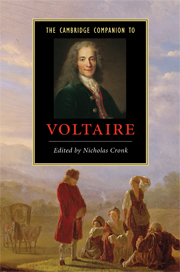Book contents
- Frontmatter
- Introduction
- 1 The making of a name: a life of Voltaire
- 2 Voltaire and authorship
- 3 Voltaire: philosopher or philosophe?
- 4 Voltaire and clandestine manuscripts
- 5 Voltaire and the myth of England
- 6 Voltaire’s masks: theatre and theatricality
- 7 Voltaire as story-teller
- 8 Candide
- 9 Voltaire and history
- 10 Voltaire’s correspondence
- 11 Voltaire: pamphlets and polemic
- 12 Voltaire and the politics of toleration
- 13 Voltaire and the Bible
- 14 The Voltaire effect
- Further reading
- Index
14 - The Voltaire effect
Published online by Cambridge University Press: 28 May 2009
- Frontmatter
- Introduction
- 1 The making of a name: a life of Voltaire
- 2 Voltaire and authorship
- 3 Voltaire: philosopher or philosophe?
- 4 Voltaire and clandestine manuscripts
- 5 Voltaire and the myth of England
- 6 Voltaire’s masks: theatre and theatricality
- 7 Voltaire as story-teller
- 8 Candide
- 9 Voltaire and history
- 10 Voltaire’s correspondence
- 11 Voltaire: pamphlets and polemic
- 12 Voltaire and the politics of toleration
- 13 Voltaire and the Bible
- 14 The Voltaire effect
- Further reading
- Index
Summary
In a media-infused society, the cultural significance of writers may seem limited to glittery fame, if not mere notoriety. Yet the case of Voltaire refutes this sceptical view of the writer's importance in society and of literature's value more generally. In his own time Voltaire enjoyed a literary significance that extended well beyond fame, both in France and among Europe's lettered elite. The best-known writer of the eighteenth century, 'the patriarch of Ferney', lived on during the next two centuries as a deeply haunting presence in France's collective cultural memory. Repeatedly, Voltaire was pressed into service in the pitched battles over the contested meaning of France's past and the direction of its future. Referred to more often than read, acquiring a cultural significance that was often decoupled from the philosophe's works themselves, 'Voltaire' became a token or signifier, a telegraphic way of staking claims, phrasing values and intervening in the political arena. The case of Voltaire, understood less as influence than as legacy, as afterlife or 'the Voltaire effect', reveals a good deal about engaged, liberal, reformist writing in the eighteenth century. The story of how 'the Voltaire effect' comes about also illustrates how an author is constructed as a culturally iconic object in order to advance or slow down that reform, or to effect change in some other way.
Voltaire's fame mixes literary celebrity, social critique and political controversy. Early in his career his public skirmishes with Church and government led to brief imprisonment in the Bastille and periods of exile from Paris, notably in England (1726-8). His Lettres philosophiques (1734) grew out of that experience, presenting an oblique yet critical view of France by praising England's promotion of religious tolerance, commerce, science and personal freedom.
- Type
- Chapter
- Information
- The Cambridge Companion to Voltaire , pp. 205 - 218Publisher: Cambridge University PressPrint publication year: 2009
- 1
- Cited by

